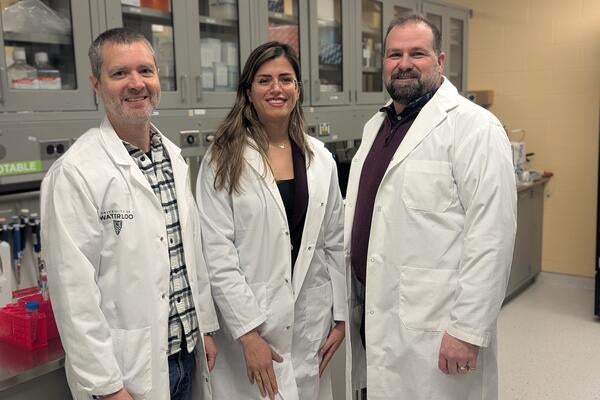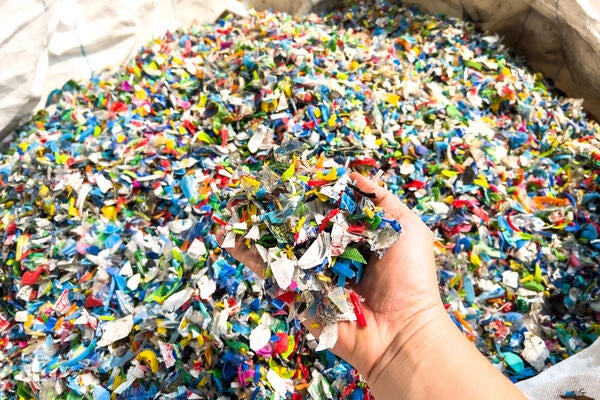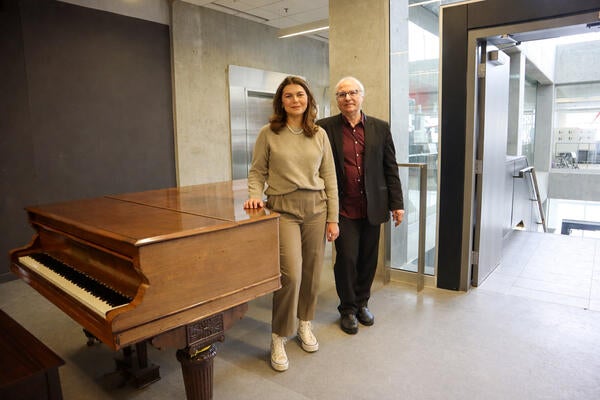
Fuel cell researcher finds Waterloo a catalyst for automotive innovation
Waterloo Engineering alumnus Drew Higgins is the award-winning recipient of a prestigious NSERC Banting Postdoctoral Fellowship

Waterloo Engineering alumnus Drew Higgins is the award-winning recipient of a prestigious NSERC Banting Postdoctoral Fellowship
By Kira Vermond Faculty of EngineeringAlthough he hasn’t slid behind the wheel of one yet, Drew Higgins hopes to drive a fuel cell vehicle someday. And here’s what would make the ride extra sweet for the recent chemical engineering alumnus: knowing the research he conducted during 11 years as a Waterloo student made the green energy source inexpensive enough to compete with gasoline.
“I strongly believe in the work that I do and the technologies that are being developed,” he says. “So what better way to demonstrate that commitment than to actually drive one of the vehicles?”
Higgins’ award-winning research focuses on making fuel cells more reliable for use in cars, buses and backup power systems, as well as on cleaning up emissions. In particular, he’s developing new catalysts that reduce the amount of expensive platinum materials commonly used in fuel cells or rely on alternative catalyst configurations. In one case, he has alloyed cobalt with platinum, which ended up not only being less expensive, but also actually boosted the platinum’s activity and effectiveness.
His eventual goal for automotive applications? To create a fuel cell that will last 5,000 hours of operation and make it competitive with typical internal combustion engines.
A recent move to start an NSERC Banting Postdoctoral Fellowship position at Stanford University in California is a big one, particularly when considering that Higgins has spent almost his entire post-secondary education at the University of Waterloo. His three chemical engineering degrees – BASc, MASc and PhD – are all from Waterloo.
While his parents, Waterloo alumni who studied math and computer science, originally encouraged him to apply to the undergraduate engineering program, new cutting edge equipment, buildings and supportive professors convinced him to stay for his other two degrees. Higgins’ supervisor, Zhongwei Chen, a chemical engineering professor, even offered to help him find an internship so Higgins could gain more experience. Chen, who is the Canada Research Chair in Advanced Materials for Clean Energy, kept his promise and Higgins spent nearly a year down at the Los Alamos National Lab in northern New Mexico, perched on the side of a mountain.
In 2014, Higgins was honoured with the Dr. Bernard S. Baker Student Research Award, which encourages and recognizes exceptional student research in fuel cell technologies. He was recognized at an award ceremony attended by leading industry, academic and government experts from the fuel cell sector.
Higgins praises Waterloo’s academic environment for enabling him to take his own research to the next level, and possibly into the car of the future.
“New equipment, new facilities and new technologies – Waterloo Engineering offered everything I needed for my research,” he says. “When I had a question, I was able to walk over to a lab and talk to a researcher who’s an expert in a particular field. That made all the difference.”

Read more
Researchers engineer bacteria capable of consuming tumours from the inside out

Hand holding small pieces of cut colourful plastic bottles, which Waterloo researchers are now able to convert into high-value products using sunlight. (RecycleMan/Getty Images)
Read more
Sunlight-powered process converts plastic waste into a valuable chemical without added emissions

University of Waterloo researchers Olga Ibragimova (left) and Dr. Chrystopher Nehaniv found that symmetry is the key to composing great melodies. (Amanda Brown/University of Waterloo)
Read more
University of Waterloo researchers uncover the hidden mathematical equations in musical melodies
The University of Waterloo acknowledges that much of our work takes place on the traditional territory of the Neutral, Anishinaabeg, and Haudenosaunee peoples. Our main campus is situated on the Haldimand Tract, the land granted to the Six Nations that includes six miles on each side of the Grand River. Our active work toward reconciliation takes place across our campuses through research, learning, teaching, and community building, and is co-ordinated within the Office of Indigenous Relations.